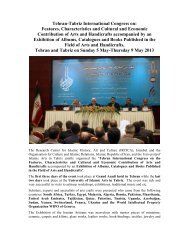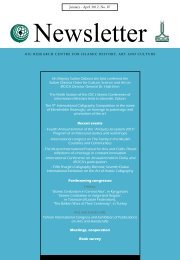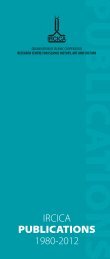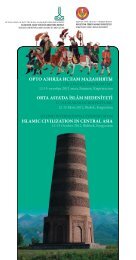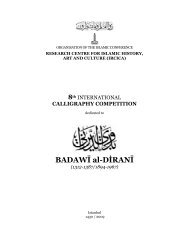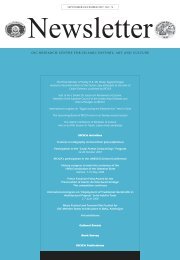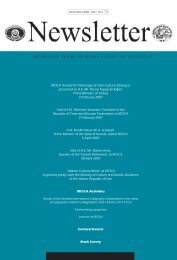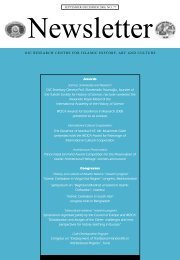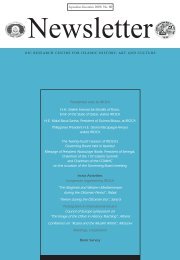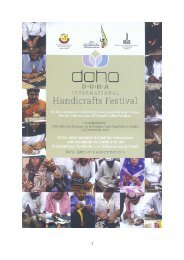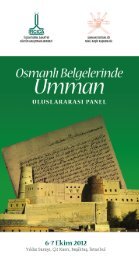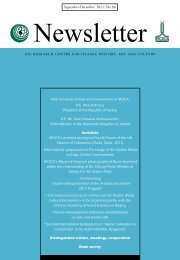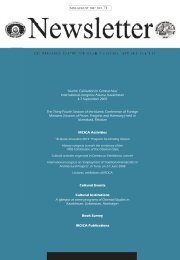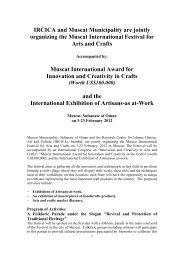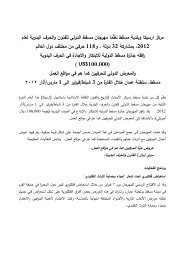IRCICA Newsletter, issue 82-83
IRCICA Newsletter, issue 82-83
IRCICA Newsletter, issue 82-83
Create successful ePaper yourself
Turn your PDF publications into a flip-book with our unique Google optimized e-Paper software.
acclaimed peaceful coexistence and make it a reality of the 21st<br />
century.<br />
In his comprehensive inaugural address the President of the<br />
Republic of Macedonia H.E. Mr. Gyorge Ivanov emphasized<br />
that the cultural heritage of the Balkans, in every historical<br />
period, has testified to the complexity of life built by different<br />
people, different religious, ethnic and linguistic communities.<br />
Revieweing the periods of turmoil, instability “Two centuries<br />
prior to the collapse of Byzantium, the Balkans suffered from<br />
political instability and internal fights between the Greek,<br />
Slavic, Venetian rulers and owners. In such an atmosphere did<br />
the Ottomans and the Islamic civilization come in the Balkans.<br />
In many national histories in the Balkans, the advent of Islam<br />
and the Ottoman rule is interpreted as the beginning of a<br />
new dark period of the Balkans the Christians will never fully<br />
recover from. However, the historical facts indicate something<br />
totally different. For example, as Mark Mazover states, an<br />
expert very well familiar with the Balkan situation: the old<br />
rulers were replaced with new one. The Ottoman soldiers<br />
(both Muslims and Christians) were rewarded with property<br />
and some of the old Byzantine duties were still being practiced.<br />
Reputable Greek and Slavic families converted to Islam and<br />
became part of the Ottoman elite, some succeeded, for a short<br />
time, to retain their property without having to change their<br />
faith. The endless wars that raged in the XIV century on the<br />
Balkans were replaced with stability brought by the organized<br />
Ottoman state. … In the 18th and 19th centuries the situation<br />
was changed. Uprisings began, new states were established.<br />
Again, there were new divisions and the Balkans became a<br />
space hard to define. After acknowledging Islam, the Balkan<br />
nations had started to think in a more tolerant way of people<br />
of other religions and different political affiliations. And there<br />
was a reaction with a desire for self-preservation. The feeling of<br />
belonging to a community and the heroic deed incentive were<br />
strengthened. This had an influence on literature, especially<br />
love poetry, folklore and epics.” President Ivanov said that in<br />
Macedonia, coexistence between Christianity and Islam can<br />
be seen almost everywhere, in the common sacred places,<br />
where both Christians and Muslims pray to God together, in<br />
the tradition of joint celebration of the most<br />
important religious holidays. “In the National<br />
Assembly, in the Government, in certain<br />
municipalities, senior officials and ordinary<br />
employees of different religions work<br />
together. … We are experiencing renewal<br />
of the religious feelings of our citizens,<br />
Christians, Muslims, Jews. This natural<br />
reaction means return to some forgotten<br />
values, and an attempt to find new answers to<br />
modern times. It is understandable that there<br />
are reactions, sometimes concern deriving<br />
from the restoration and the new forms of<br />
religious life in Macedonia. Therefore, we<br />
must know each other better, insist on the<br />
notion that respect for one’s own religion is<br />
not an act directed against someone else. As<br />
is freedom of citizens who do not belong to<br />
a particular religion, who certainly have the<br />
right to act contrary to religious rules, cannot and may not be<br />
understood as an attack on religion. Macedonian multiethnic<br />
and multi-confessional character does not mean that the<br />
construction of religious temples should be limited, or studying<br />
the religions should be restricted, so as not to offend the others.<br />
On the contrary, this means freedom to celebrate religion, as<br />
well as freedom not to celebrate any religion. Certainly, religion<br />
may not be imposed, and may not intimidate. To be vital, the<br />
system of belief must be open and provide an opportunity to<br />
the believers to answer adequately to the question of doubt. A<br />
strong religion does not force its believers; a strong religion<br />
attracts believers like a light in the night. Our outstanding<br />
contribution as a country in which religions, traditions and<br />
various ethnic groups cooperate in building a common home<br />
and are in quest of answers to certain eternal questions, is a<br />
proof that a better future for the region, Europe and the world<br />
is possible.”<br />
The opening ceremony was followed by a plenary session<br />
where scholarly addresses were given by Prof. Georgi<br />
Stardelov (“Historic Meeting of Civilisations and Cultures<br />
in the Balkans”), Dr. Behijuddin Shehapi from the National<br />
Conservation Centre for Cultural Heritage, Skopje (“Islamic<br />
CulturalHeritage in Macedonia”), Dr. Halit Eren (“Pax<br />
Ottomana” in the Balkans”), President George Ivanov (“The<br />
Millet System in the Ottoman Empire”), and Prof. Ekmeleddin<br />
İhsanoğlu (Concluding Remarks).<br />
An Archaeological Exhibition, by Mr. Dragi Mitrevski-Dragica<br />
Zivkova, entitled “From the Ottoman Culture on the Skopje<br />
Castle” was opened the same day.<br />
The sessions heard 125 papers which were selected from among<br />
300 applications. The presentations were related to the spread<br />
and evolution of Islamic culture in the Balkans, religious<br />
coexistence, educational and cultural institutions, science and<br />
technology, architecture and urbanism, arts, social life and<br />
traditions, state and preservation of tangible and intangible<br />
Islamic heritage, academic cooperation in Balkan studies,<br />
problems encountered, <strong>issue</strong>s relating to dissemination of new<br />
research, aong others.<br />
The opening of the exhibion<br />
May-August, No: <strong>82</strong> / September-December 2010, No: <strong>83</strong> <strong>Newsletter</strong><br />
13



